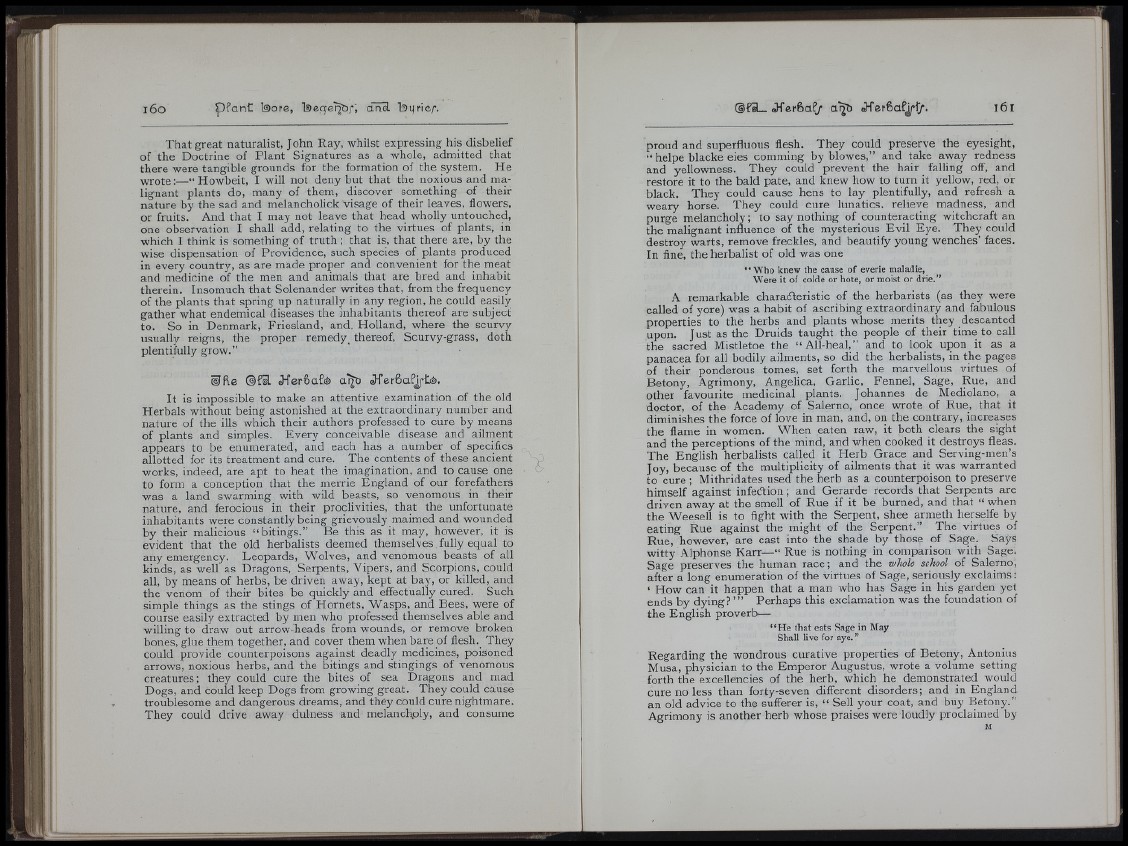
! i
I (
i
That great naturalist, John Ray, whilst expressing his disbelief
of the Doctrine of Plant Signatures as a whole, admitted that
there were tangible grounds for the formation of the system. He
■wrote:— “ Howbeit, I will not deny but that the noxious and malignant
plants do, many of them, discover something of their
nature by the sad and melancholick visage of their leaves, flowers,
or fruits. And that I may not leave that head wholly untouched,
one observation I shall add, relating to the virtues of plants, in
which I think is something of truth; that is, that there are, by the
wise dispensation of Providence, such species of plants produced
in every country, as are made proper and convenient for the meat
and medicine of the men and animals that are bred and inhabit
therein. Insomuch that Solenander writes that, from the frequency
of the plants that spring up naturally in any region, he could easily
gather what endemical diseases the inhabitants thereof are subject
to. So in Denmark, Friesland, and. Holland, where the scurvy
usually reigns, the proper remedy^ thereof, Scurvy-grass, doth
plentifully grow.”
UR© ©FiL df©r6aF/á) JF©rRaFj|*té.
It is impossible to make an attentive examination of the old
Herbáis without being astonished at the extraordinary number and
nature of the ills which their authors professed to cure by means
of plants and simples. Eve ry conceivable disease and ailment
appears to be enumerated, and each has a number of specifics
allotted for its treatment and cure. The contents of these ancient
works, indeed, are apt to heat the imagination, and to cause one
to form a conception that the merrie England of our forefathers
was a land swarming with wild beasts, so venomous in their
nature, and ferocious in their proclivities, that the unfortunate
inhabitants were constantly being grievously maimed and wounded
by their malicious “ bitings.” Be this as it may, however, it is
evident that the old herbalists deemed themselves fully equal to
any emergency. Leopards, Wolves, and venomous beasts of all
kinds, as well as Dragons, Serpents, Vipers, and Scorpions, could
all, by means of herbs, be driven away, kept at bay, or killed, and
the venom of their bites be quickly and efiectually cured. Such
simple things as the stings of Hornets, Wasps, and Bees, were of
course easily extracted by men who professed themselves able and
willing to draw out arrow-heads from wounds, or remove broken
bones, glue them together, and cover them when bare of flesh. They
could provide counterpoisons against deadly medicines, poisoned
arrows, noxious herbs, and the bitings and stingings of venomous
creatures; they could cure the bites of sea Dragons and mad
Dogs, and could keep Dogs from growing great. They could cause
troublesome and dangerous dreams, and they could cure nightmare.
They could drive away dulness and melanchply, and consume
MM
proud and superfluous flesh. They could preserve the eyesight,
“ helpe blacke eies comming by blowes,” and take away redness
and yellowness. They could prevent the hair falling off, and
restore it to the bald pate, and knew how to turn it yellow, red, or
black. They could cause hens to lay plentifully, and refresh a
weary horse. They could cure lunatics, relieve madness, and
purge melancholy; to say nothing of counteracting witchcraft an
the malignant influence of the mysterious E v il Eye. They could
destroy warts, remove freckles, and beautify young wenches’ faces.
In fine, the herbalist of old was one
“ Who knew the cause of everie maladie,
Were it of colde or hote, or moist or drie,”
A remarkable charadteristic of the herbarists (as they were
called of yore) was a habit of ascribing extraordinary and fabulous
properties to the herbs and plants whose merits they descanted
upon. Just as the Druids taught the people of their time to call
the sacred Mistletoe the “ All-heal,” and to look upon it as a
panacea for all bodily ailments, so did the herbalists, in the pages
of their ponderous tomes, set forth the marvellous virtues of
Betony, Agrimony, Angelica, Garlic, Fennel, Sage, Rue, and
other favourite medicinal plants. Johannes de Mediolano, a
doctor, of the Academy of Salerno, once wrote of Rue, that it
diminishes the force of love in man, and, on the contrary, increases
the flame in women. When eaten raw, it both clears the sight
and the perceptions of the mind, and when cooked it destroys fleas.
The English herbalists called it Herb Grace and Serving-men’s
Joy, because of the multiplicity of ailments that it was warranted
to cure; Mithridates used the herb as a counterpoison to preserve
himself against in fe a ion ; and Gerarde records that Serpents are
driven away at the smell of Rue if it be burned, and that “ when
the Weesell is to fight with the Serpent, shee armeth her selfe by
eating Rue against the might of the Serpent.” The virtues of
Rue, however, are cast into the shade by those of Sage. Says
witty Alphonse Karr—“ Rue is nothing in comparison with Sage.
Sage preserves the human race; and the whole school of Salerno,
after a long enumeration of the virtues of Sage, seriously exclaims:
‘ How can it happen that a man who has Sage in his garden yet
ends by dying? ’ ” Perhaps this exclamation was the foundation of
the English proverb—
“ He that eats Sage in May
Shall live for aye. ”
Regarding the wondrous curative properties of Betony, Antonins
Musa, physician to the Emperor Augustus, wrote a volume setting
forth the excellencies of the herb, which he demonstrated would
cure no less than forty-seven difierent disorders; and in England
an old advice to the sufierer is, “ Sell your coat, and buy Betony.”
Agrimony is another herb whose praises were loudly proclaimed by
M